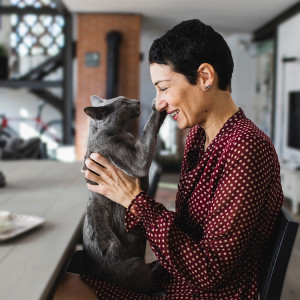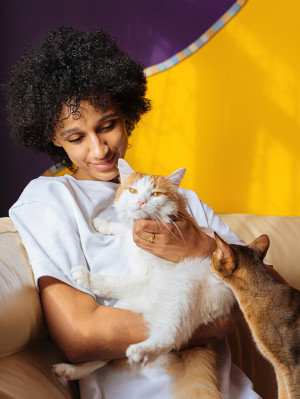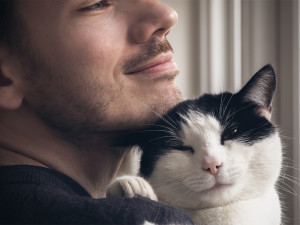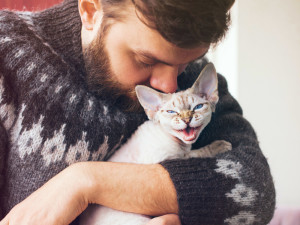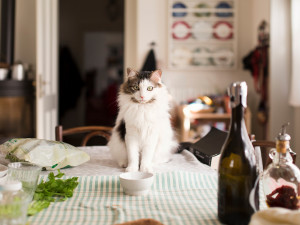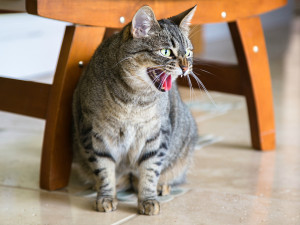Do Cats Get Jealous? Exploring Feline Emotions and Social Dynamics
Is there a green-eyed monster hiding in that adorable ball of fluff?
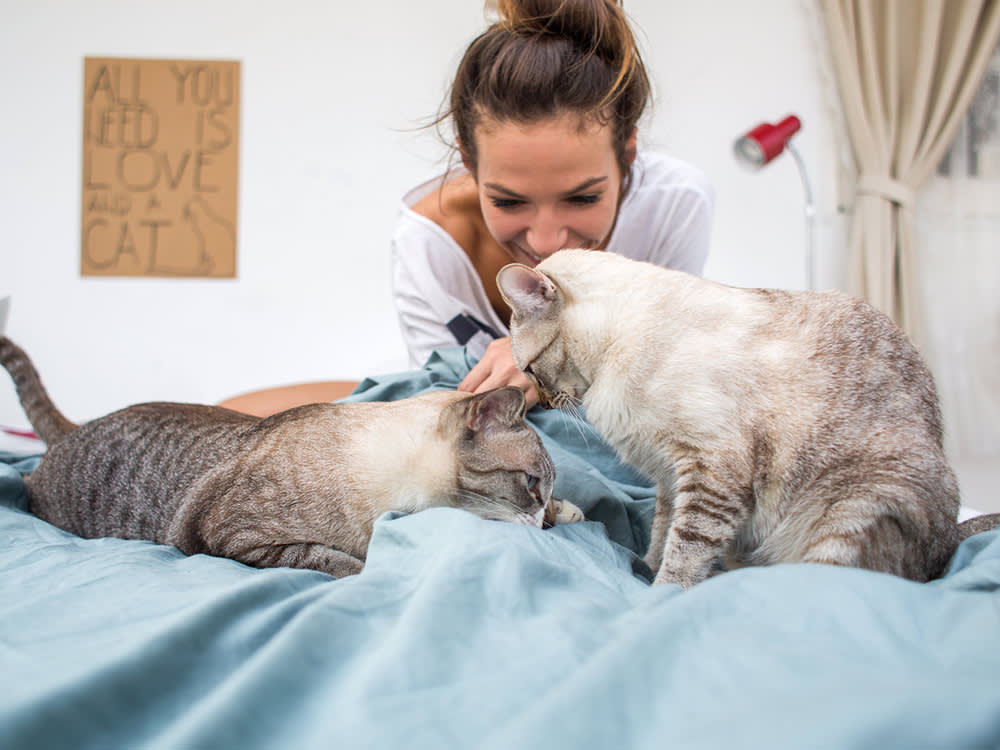
Share Article
There are many people who assume that jealousy is uniquely human, but the same exclusivity was thought to be true about many traits that have since been found in many other animals: tool use, language, abstract thought, art, personality, humor, music, and grief, to name but a few.
Jealousy is an emotion that evolved to protect social relationships from intrusion by outsiders to those relationships. So, it is likely to exist in many animals who value social connection, including cats. So, do cats get jealous? It’s hard to imagine they don’t.
Do cats experience jealousy?
Research about jealousy in animals is not common, and even the work that is published on the subject focuses on behaviors, rather than the emotion itself. So, if the goal is to know whether cats experience jealousy like humans, or just exhibit behaviors consistent with jealousy, we really don’t have the answer.

The same is true when we observe people who we “know” are jealous. The observations we make are based on behavior as well as expressions related to sadness, anger, anxiety, and fear. The anxiety causes a monitoring of the situation, and the other negative emotions result in attempts to protect the relationship. That monitoring and those attempts are the behaviors we see when we observe cats acting (and presumably feeling) jealous.
We lack the research, but with behaviors similar to those expressed by humans who are jealous, it is reasonable to assume that cats do experience the complex emotion of jealousy, just as we assume humans do based on their behavior.
What are some signs that a cat may be exhibiting jealousy?
Because it is not always possible to know for certain how a cat is feeling, it is smart to pay attention to their behavior and think about how that may provide clues to their emotions. With jealousy in mind, behavioral clues that they are experiencing that emotion can be any action that attempts to monopolize someone or get rid of any competitors for affection, attention, and resources.
One of the most common signs of jealousy in cats is acting possessive of their pet parents or of other members of the household. That can be a dog, another cat, a rabbit, a child, or anyone else they like to be social with. Sometimes that possessiveness involves acting aggressively towards other animals or to people. The aggression can be simply threats or can involve scratching and biting, too. Some jealous cats never behave aggressively, but others are so upset by their big feelings they cause harm. Many cats seek extra attention by approaching more frequently, rubbing against you, or lying down in a spot right in front of you or on top of what you are working on.
Other behaviors that may indicate you have a green-eyed monster within that cute kitty body sharing your home could be any behavior that suggests they are upset or stressed. Being upset by jealousy can result in a variety of behaviors. Destructive behavior may pop up with cats clawing at things or knocking them over. Excessive vocalizing is another sign of a cat who is upset or stressed, so some jealous cats may act in this way. Other cats react to negative emotions by hiding or evasive behavior, so if your cat sneaks off or avoids other members of the household, those actions can also be clues that a cat is feeling jealous. Some cats who are upset will groom excessively, so this behavior change can be a useful barometer of your cat’s emotional state.
What are common triggers for jealousy in cats?
Any change to their routine that results in them receiving less of something they enjoy can trigger jealousy. They can also be upset by another member of the household receiving good things like food, treats, attention, and playtime. Seeing someone else receive lots of attention, toys, or treats are common triggers, and they can all result from various events. Adopting a new pet into the household — whether it’s another cat, a dog, a rabbit, a goat, or a horse — can leave a resident cat feeling jealous. If a pet parent is preoccupied, extra busy with work, giving more attention to another pet or begins a relationship with a new person, a cat can become jealous. If a change in routine results in less attention from people in the household, or their cat buddy becomes BFFs with the new dog, a jealous cat may be the fallout from that change.
Could underlying health issues contribute to jealous behaviors in cats?
If cats have health issues that limit their access to certain areas of the house, the result can be jealousy. For example, if an injured or older cat becomes unable to jump up on the bed but other pets are up there for hours enjoying affection from the people binge watching Ted Lasso, for example, the cat who is left out is certainly likely to feel jealous. If they are too overweight for a certain perch to support them, but another cat is on it, jealousy is understandable. So, if health issues mean they can’t access certain areas to get attention or can’t physically participate in socializing, those health issues could indeed contribute to jealous behaviors.
How can I manage or prevent jealousy in my cat?
To prevent and manage feline jealousy, focus on making sure your cat is getting enough attention, playtime, treats, and toys. Provide them with additional cozy perches or good spots to sleep if they are acting jealous or if an impending change is coming. If there has been a big change, such as a baby or a new pet, they may need even more expressions of love from you than before because they may be hyper-aware they have to share you now, and not every cat likes that or is able to cope well.
It helps to introduce new pets or people slowly and gradually and to do all you can to make the introductions positive. You want your cat to associate any changes with good things and attention in the form of treats, petting, and playtime rather than associating changes with a decline in life’s pleasures. It always helps to be patient, empathetic, and understanding with your cat. It can be hard for them to adjust to big changes, and the more you attend to their needs and focus on them, the easier it will be to manage and prevent jealousy in your cat.
Can professional behavior modification techniques help with jealous behaviors in cats?
If you are concerned about your cat’s behavior, including behavior that may indicate jealousy, there are people who specialize in cat behavior who can help you. These experts have conducted research in behavior and have studied behavior extensively while getting a PhD in biology, zoology, or psychology. Behavior modification will often be a part of what they do to help cats, though they may also advise changing some routines that affect your cat or advise you on the best types of enrichment (play, treats, catios, exploring outside, training) to add to your cat’s life.
Jealousy is a complex emotion, and cats are delightfully complex beings. Although there is not conclusive research about jealousy in cats (yet!), it is far easier to imagine they experience this emotion than to imagine a world in which they don’t.
References

Karen B. London, PhD, CAAB, CPDT-KA
Karen B. London is a certified applied animal behaviorist (CAAB) and certified professional dog trainer (CPDT) who specializes in working with dogs with serious behavioral issues, including aggression. She has written for a variety of magazines including The Bark, Clean Run, and the APDT Chronicle of the Dog, and has published in scientific journals including Behavioral Ecology and Sociobiology, Ethology, Ecology, and Evolution, the Journal of Insect Behavior, and Insectes Sociaux. She is the author of seven books about dog training and canine behavior, including the forthcoming My Dog's Mystery Adventure: And Other Stories From a Canine Behaviorist and Dog Trainer.
Related articles
![Short haired woman holding a gray cat that's playfully pawing at her nose]()
Does Your Cat’s Fur Pattern Determine Their Personality?
It’s a little more complicated than that.
![A woman with curly black hair sitting in front of a dark purple and yellow backdrop while looking down affectionately at her two cats sitting on her lap]()
How to Build Your New Cat’s Trust in You
If your cat still approaches you with a figurative arched eyebrow of skepticism, try these tricks to put them at ease.
![cat snuggling man]()
What’s Your Cat’s Love Language?
Five surprising ways cats show affection (and how you can show it back), according to a cat behaviorist.
![cat meowing]()
Why Does My Cat Meow So Much? Reasons Your Cat Meows Excessively
How to decode your cat’s love language when one meow has many meanings.
![cat staring at person on table]()
Why Does My Cat Stare at Me?
...Is it something you said?
![cat hissing under chair]()
Cat Hissing: Fair Warning or Fighting Words?
Your cat’s hissy fit could mean Don’t test me or Let’s do this. We wouldn’t call their bluff.


